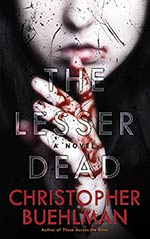
![]() Nymeria
Nymeria
8/12/2016
![]()
The first time I heard about this author was through reviews of his upcoming new novel The Suicide Motor Club, so I decided to try out his previous works and settled on this one whose main theme – vampires in the very urbanized context of New York city in the late '70s – sounded quite promising. Well, it was more than that, a great deal more.
The vampire myth is one of the staples of horror fiction, one that underwent many permutations lately, from the humorous declination of a handful of movies to the angsty, overly romanticized version of a certain well-known saga, but for me the true vampire is the one that remains true to its first incarnation: the blood-drinking monster preying on defenseless humanity, and Christopher Buehlman's vampires are exactly that -- without frills or sparkly glamor.
The action takes place in 1978 New York and the story is told from the point of view of Joey Peacock, who was turned into a vampire in 1933 at the age of fourteen: 45 years later he's living (if you can use that term with the undead, of course) with a community of his brethren in the abandoned tunnels of New York's subway system. The group is led by Margaret, formerly a maid in Joey's household, and she rules them with the iron fist of a queen of old: one of the most fascinating sides of this novel comes exactly from the dynamics of this vampire community and the different personalities of its members, who have somehow retained the characteristics of their lost humanity, integrating them into the changed necessities of their state as vampires.
For example, Joey - despite his decades as a blood predator - still remains the pampered, selfish teenager he was at the time he was turned, and the author's skill in characterization shines through in the balance he achieves between the wise cunning of the vampire he is and the petty yearnings of the youth he was. There is a scene that drives home this duality and that stayed with me for some time, due to its chilling quality: Buehlman's vampires have no need to physically subdue their victims, since they can exert some form of hypnosis that renders them docile and accepting, and that's exactly what Joey does with a whole family, sitting with them in front of the TV, watching some mindless, mind-numbing show, as he feeds from each of them in turn as if from a box of snacks.
There is nothing romantic in these vampires, not in the way they cater to their own needs, nor in the way they live: despite the attempts at decorating their subterranean lairs, still the life they lead closely resembles that of the homeless with whom they share the tunnels. Darkness, dirt and decay are their constant companions, with no concession to glamor whatsoever - except the one they wear to move undisturbed and unnoticed through an oblivious humanity, made even more oblivious by the "sex, drugs and rock-and-roll" attitude of the times. This lack of any exotic overtone to Buehlman's vampires is compounded by the creeping awareness that the undead are not immune from decline, that eternity is tainted by isolation, melancholy or peculiar forms of madness that are as dangerous as their human counterparts, as it happens with Night Fever:
You might guess it's kinda like cabin fever, and, yeah, that's close. Night fever is what happens when a vampire can't take being in the dark anymore. [...] It's a disease of the soul.
The status quo is broken when Joey's community becomes aware of a group of vampire children who not only prey on humans without the discretion necessary to keep their existence concealed, but also engage in gruesome rituals before killing their victims. Margaret and Co. are compelled to intervene, not out of a sense of compassion toward the murdered humans, but rather because of the threat of discovery, while Joey and his friend Cvetko - and older, scholarly-inclined vampire - also feel a need to protect these children, whose former innocence still seems to flash through their animalistic behavior. And this will lead them on an unexpected path...
What I most enjoyed in this book is the way any expectations I had were twisted beyond recognition, starting with Joey himself: he warns the readers up front that he's a deceiver, someone who cannot be trusted:
You will be burdened with an unreliable narrator who will disappoint and repel you at every turn.
Still with me?
Too bad for you.
I can't wait to break your heart.
Despite the warning - or because of it? - the atmosphere drew me in and kept me spellbound until the very last page: part of it is due to Joey's peculiar narrative style, more like a stream-of-consciousness report than a coherent tale, and part is due to the strong feeling of impending disaster that permeates the air, of looming danger that has no form or substance and yet is there, just out of the corner of one's eye, unavoidable and at the same time utterly fascinating.
Buehlman dares his readers to go on, to see what's around the next dark corner, while at the same time he warns them that things are not what they seem, but just like his vampires, once we have opened the book, once we have invited him in, there is not way we can escape the spell. Even when the story seems to have reached its end, before the last chapter named "Coda", he warns us about proceeding no further, but by that time he has ensnared us so deeply that there is no other way than forward, and on to a shattering surprise.
Well done, viciously well done...
http://spaceandsorcery.wordpress.com